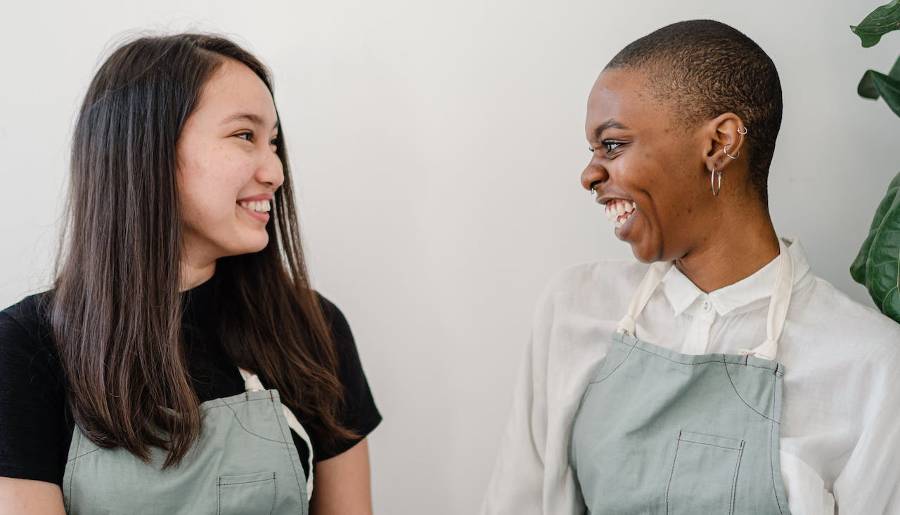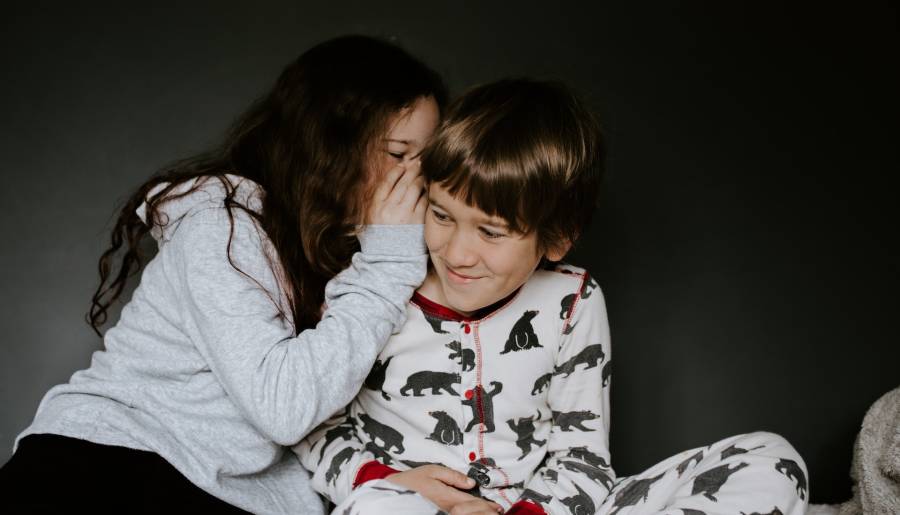How to Write Dialogue Like a Pro
You're invited to join our 8-week online course on how to write dialogue.
Let's say you ask four different people how to make a cheese sandwich...
Person One responds: "You just take a piece of cheese and put it between two slices of bread."
Person Two: "Seriously? You don't know how to make a cheese sandwich?"
Person Three: "Personally, I would recommend goat cheese or perhaps a ripe Camembert, on a fresh baguette or perhaps brioche, lightly toasted, with caramelized onions or perhaps candied figs."
Person Four: "Sorry, I don't do dairy."
Different people speak differently. The differences are not only in what they say, but in the way they say it.
That's one reason why dialogue—presenting your characters' speech in their exact words—is such a powerful tool for your fiction.
Dialogue helps you show what your characters are like instead of just describing them to your reader.
It also draws readers into a scene and makes your writing a lot more fun to read!
How to Write Dialogue - Skip to Topic
- Getting great at dialogue
- Conversation versus written dialogue
- Dialogue and summary
- Dialogue format
- Tags
- Descriptive beats
- Adding layers
- Tips on how to write dialogue

Getting Great at Dialogue
To get great at writing dialogue, listen to how different kinds of people talk. Pay attention to...
- What they say (of course).
- What they DON'T say. Are they beating around the bush? Are they intentionally avoiding something?
- The kinds of words they use. Do they use simple or sophisticated vocabulary? Do they use slang? Jargon? Profanity? Do they have a favorite word or expression?
- Their tone. Polite? Rude? Bossy? Self-effacing? Flirtatious? Blunt? Chatty?
- The rhythms of their speech. Do they use short choppy sentences, or long ones that wind on and on?
- What does the way these people speak express about who they are?
You can borrow their voices for your characters.
If you're struggling with dialogue, here's a shortcut. Just think of someone who speaks the way your character might. Then, whenever your character is speaking, try to hear that person's voice in your head.
When you're writing or revising dialogue, you might also find it helpful to say the lines out loud or even act them out.
During your first draft, you'll listen to your characters speaking in your imagination and write down what they say.
Later, during the revision, you'll probably end up trimming some of those conversations down...

Conversation Versus Written Dialogue
Dialogue on the page is not the same as the way people really talk.
You want to give the flavor of reality, but you're not imitating it exactly.
In real-life conversations, there's a lot of fluff and filler and repetition. If you included all that in a story, it would get boring fast.
You want to include just enough of that to make the conversation feel real. And cut the rest.
Let's say two people, Joan and Edgar, meet in a restaurant. The real conversation might begin like this...
ORIGINAL VERSION:
"Hi," Joan said.
"Hi."
"Sorry I'm late."
"Don't worry, I just got here too," Edgar said.
"I couldn't find parking."
"I couldn't either. I finally wound up parking behind that church."
"Which church?"
"The one on—what's that street called?"
"Barry Street?"
"No, further down."
"I don't know..."
"The one with that store—what's that store called?"
"I don't know."
"Like, the store that sells everything. You know?"
"I'm not sure..."
The waitress came over to their table. "Hi, I'm Kelsey! I'm going to be your server! How are we doing today?"
"Fine, thanks," Joan said.
"Not bad," Edgar said.
"Can I get you folks something to drink?" the waitress asked.
"I could really use a glass of wine," Joan said. "But I probably shouldn't."
The waitress waited.
"I'll have a diet Coke," Edgar said.
"Great!" said the waitress. "And what can I get for you?" she asked, turning back to Joan.
"I'd kill for a glass of wine."
"We have a nice house red," the waitress offered.
"But I shouldn't drink. I have to go back to work," Joan explained.
The waitress waited.
"Can I see a wine list?" Joan asked.
"It's right here," Edgar said, handing it to her.
"Okay, I'll be right back," the waitress said. "In the meantime, I'll bring some ice water for you."
"And a diet Coke," Edgar reminded her.
"Absolutely," the waitress said, walking off.
"So," Joan said when she was gone, "I heard the police are looking at Duffy now."
"Where'd you hear that?" Edgar asked.
"McConnell. He says Duffy's their top suspect."
"That's good," Edgar said.
"Yeah."
"Tell me everything."
"Wait, I'm just going to look at the wine list real quick. I know I shouldn't be drinking wine, but..."
If you wanted to use this conversation in a story, you might write it like this...
REVISED VERSION:
"Sorry I'm late," Joan said.
"That's all right," Edgar said.
The waitress came over, and Joan ordered a glass of wine. "So," she said when the waitress left again, "I heard the police suspect Duffy now."
"Where'd you hear that?" Edgar asked.
"McConnell. He says Duffy's their number one suspect."
"That's good," Edgar said.
"Yeah."
"Tell me everything."
If you want to show more about what Joan is like, you might keep some of her dithering over the wine, but cut the small talk at the very beginning. But you won't transcribe every word that Joan and Edgar utter during their lunch together.
Every piece of dialogue should be serving a purpose in your story. Often, it will be accomplishing more than one task at a time (e.g., showing something about the character at the same time that it's moving the plot forward).
Keep in mind the purpose of the dialogue when you decide which parts to cut and which parts to leave in.

Dialogue and Summary
Here's an example of summary dialogue:
Myrna complained about the hotel her son had chosen.
Here's an example of direct dialogue:
"The hotel's a real dump," Myrna said. "The room's tiny, and there's hardly any closet space. And the soap dish in the shower? It has a hole in it, so the soap falls right through! Who designed that soap dish, and what in the world were they thinking? And there's no place to put your towels..."
In summary dialogue, the author TELLS the reader what Myrna said. In direct dialogue, the author SHOWS Myrna saying it by quoting her exact words.
Some advantages of direct dialogue:
- It's more specific (we find out exactly what Myrna didn't like about the hotel—and can form our own opinion about how serious her complaints are).
- It conveys character (we learn something about Myrna from the way she describes the hotel).
- It's more vivid (the reader feels like they're hearing the conversation firsthand).
A big advantage of summary...
- It's brief.
Imagine that Myrna continues complaining for several hours. The reader isn't going to want to hear all that.
So you can summarize:
Myrna spent the whole morning complaining about the hotel.
Or, you can mix dialogue with summary:
"I hardly slept last night," Myrna said. "That hotel room was so noisy. And the pillows were too fat." She continued complaining about the hotel all through breakfast and the long drive to David's house.
Mixing dialogue with summary allows you to give the flavor of the dialogue without taking up more space than you want to.
You decide how much direct dialogue to include, depending on your goals for the scene.
How to Write Dialogue: Format
Standard dialogue format varies a bit from country to country.
You can look at some published novels from your own country to see how the dialogue's formatted.
In the U.S., dialogue generally looks like this...
"I love you so much," Yolanda said.
"Then why did you try to poison me?" Julian asked her.
Note that the punctuation of the speakers' words is inside the quotation marks. And in Yolanda's sentence, the period (full stop) is changed into a comma.
Compare...
RIGHT: "I love you so much," Yolanda said.
WRONG: "I love you so much." Yolanda said.
When writing dialogue, it's common practice to start a new paragraph each time the speaker changes. This makes it easier for the reader to keep track of who says what.

How to Write Dialogue: Tags
You use dialogue tags to let the reader know who's speaking. Here are some examples of dialogue tags:
- Joan said
- said Edgar
- Edgar asked
- the waitress told them
You don't necessarily have to use a dialogue tag in every line of dialogue. Sometimes it's perfectly clear without them who the speaker is. For example, take the following conversation between two characters.
"Will you marry me?" Yolanda asked.
"Absolutely not," said Julian.
"Why not? Why won't you marry me?"
"Because you tried to poison me, Yolanda."
"That was an accident!" Yolanda said.
"How do you accidentally slip arsenic into somebody's drink?"
In this example, it's clear that Yolanda's the one who asks "Why won't you marry me?" so it's not necessary to use a dialogue tag there.
You're likely to need dialogue tags...
- at the beginning of a conversation, to establish who the participants are.
- if there are more than two speakers.
- when you haven't used dialogue tags in a while (to remind readers who's saying what)
There are several uses for dialogue tags. The obvious one, the main use, is to prevent confusion about the speaker's identity.
A second use is to create a little break or pause in the conversation. Compare two versions of another exchange between Yolanda and Julian.
VERSION 1:
"Why did you try to poison me?" Julian asked.
"Because I was jealous," Yolanda said.
VERSION 2:
"Why did you try to poison me?" Julian asked.
"Because," Yolanda said, "I was jealous."
Do you hear the difference? In the second version, the dialogue tag creates a little pause after the word "Because." Yolanda might be thinking about her answer, or she might be pausing for emphasis. But the placement of the dialogue tag subtly changes the rhythm of Yolanda's line.
The standard dialogue tags "said," "told," and "asked" are almost invisible to readers. In general, readers won't even notice they're there. They'll focus instead on the characters' words.
On the other hand, flashier dialogue tags like "wheedled", "sneered", "commanded," "whined," etc., can get distracting if they're overused...
"Please, please marry me," Yolanda wheedled.
"You've got to be kidding," Julian sneered.
"No one ever wants to marry me," Yolanda whined.
Generally, readers should be able to tell from the character's words if the character is wheedling or sneering.
It's okay to throw in a colorful dialogue tag here once in a while if it adds to the reader's experience. But don't go overboard with them.
And don't worry that you're "repeating yourself" because you're using the words "said" and "told" a lot in your dialogue tags. If the dialogue's interesting enough, the reader won't even notice those words.

How to Write Dialogue: Descriptive Beats
A descriptive beat is a small piece of action or description inserted into the dialogue. Here's an example of dialogue containing descriptive beats...
"I don't want it," Eva said, pushing the file back across the table.
James raised his eyebrows. "Do you know what I went through to get that for you?" he said.
In this example, the descriptive beats are:
- pushing the file across the table
- He raised his eyebrows.
Here are some ways to use descriptive beats in your dialogue.
1) To create a pause.
We talked about using a dialogue tag to change the rhythm of a line of dialogue.
A descriptive beat is another way to insert a pause—and the longer the line of description, the longer the pause.
Compare...
VERSION 1
"I don't want it," Eva said, pushing the file back across the table.
James raised his eyebrows. "Do you know what I went through to get that for you?" he said.
VERSION 2
"I don't want it," Eva said.
"Do you know what I went through to get that for you?" James said.
Do you feel the difference in the rhythm? In the version with descriptive beats, there's a pause between Eva's statement and James's answer. In the version without them, James seems to respond immediately.
If there's a long pause in the middle of a conversation, you can tell the reader that; e.g., "Neither of them spoke for several minutes." But if you want to make the reader *feel* the pause, the silence stretching on, you can spend a bit of time describing what else is going on with your main character and their surroundings: Eva's pounding headache, a fly buzzing around the table and briefly landing on Eva's sleeve, a car horn honking outside...
2) You can use descriptive beats instead of dialogue tags. Instead of 'Eva said' or 'James said', you can show who's talking with the descriptive beats. For example, here's Eva and James's conversation with only the descriptive beats to identify the speakers:
"I don't want it." Eva pushed the file back across the table.
James raised his eyebrows. "Do you know what I went through to get that for you?"
3) You can use descriptive beats to help readers visualize the scene.
Particularly in long passages of dialogue, you want to avoid "Talking Head Syndrome", where the voices seem to be floating in space. Descriptive beats allow you to provide some visual details to keep readers grounded.
4) You can use descriptive beats to add emotional layers to the dialogue.
Your characters' body language hint at what the characters are feeling—which might not always match up with their words!
Compare:
- "I love you too," she said, her face radiant.
- "I love you too," she said, but avoided his eyes.
- "I love you too," she said between clenched teeth.

How to Write Dialogue with Layers
In some cases, it makes sense to keep the dialogue very straightforward and to-the-point. But in other cases, this can feel a bit flat.
If your detective asks the suspect where she was during the time of the murder, the suspect might simply answer the question. "Eight o'clock this morning? I was at home." A simple exchange of information.
But dialogue is often more interesting if there's something else going on at the same time.
Going back to the example of the detective interviewing the suspect, here are some ways you might liven up their exchange:
- The suspect might be distracted by something else. Maybe her toddler is throwing a tantrum during the conversation.
- The suspect might attempt to flirt with the detective, or to intimidate him. Maybe she has a grudge against policemen and becomes very hostile.
- The suspect might be hiding something (relevant or irrelevant to the conversation).
- The suspect might have her own agenda. Maybe she's just interested in showing off how rich and important she is.
- The suspect might be trying to steer the conversation in another direction. Maybe she's a political activist, and she's trying to convince the detective to vote for her candidate.
- The suspect might be doing something else at the same time. Maybe she's making an ice sculpture for a wedding while they talk.
By adding another layer to the conversation, you can develop character or setting at the same time, and you can add dimension to the scene.

Tips on How to Write Dialogue
To recap some of what we've discussed, here are seven tips on how to write dialogue like a pro.
1) Give each of your characters a different voice. Try to hear their voices in your head as you're writing what they say. Your characters' unique ways of talking will depend on personality, age, cultural and educational background, as well as their relationships with the people they're talking to.
2) Know when to summarize. If a character talks for an hour about his golf technique, you can't include the whole speech in your story. Instead, you can summarize: "John went on for an hour about his golf technique."
3) Mix dialogue and summary. You can mix a few lines of dialogue into a dialogue summary to give readers the flavor of your character's voice. "'Been working on my swing,' John said, launching into an hour-long discourse on his golf technique."
4) Use indirection. Often, people don't express what's on their mind directly. Instead, they hint at it in other ways. If John is attracted to Marsha, he might not come out and say to her, "I'm attracted to you." Instead, he might become boastful around her, or steer the conversation around to whether she's married. The best dialogue often has two levels, what characters are saying on the surface, and what they really mean.
5) Use silences. Pauses in a conversation can be as expressive as what is said out loud. During a pause, you can describe the characters' body language, what they're doing (e.g., taking a sip of coffee), or what's happening around them.
6) Trim the fat. Real-life conversation contains a lot of filler, false starts, repetition, polite blah-blah-blah. If you include all of this in your written dialogue, it can get boring. Instead, you can include just enough to give the flavor of real life, then cut the rest.
7) Don't pile on distracting dialogue tags. Fancy dialogue tags such as "he whined," "she commanded," or "he queried" draw attention to themselves. The old standbys, "said," "told," and "asked" are less noticeable, letting readers focus on your characters' words.
How to Write Dialogue - Next Steps
- Be sure to join our free email group for more writing advice and ideas.
- You're also invited to join our online course on how to write dialogue.
- Learn how to outline a novel.
- Learn how to write a story or a novel.